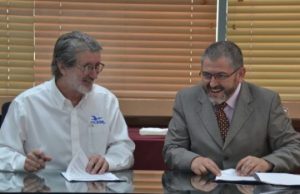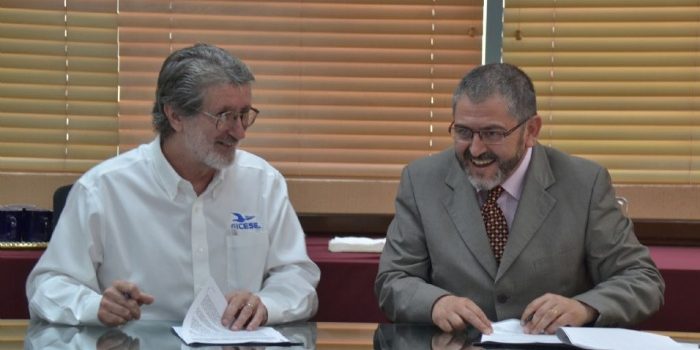IFOP signed collaboration agreement with Cicese of México
December 1st, 2016
Guido Marinone and Leonardo Núñez signing the agreement (Source ElVigia.net)
The agreement will promote scientific support and training of human resources, mainly.
(Source of news and photo: ElVigia.net) With the signing of a general collaboration agreement between the Centro de Investigación Científica y de Educación Superior de Ensenada (Cicese) and the Instituto de Fomento Pesquero de Chile (IFOP), whose signing was ratified on Monday, November 28, at the city of Ensenada, Baja California, Mexico. In this way, formality is given to a process of collaboration that persist for more than 20 years between these two entities, and progress is made in meeting common objectives in terms of scientific collaboration, human resources training and promotion of joint research lines.
This agreement between Cicese and IFOP was signed by the directors of both institutions, Guido Marinone Moschetto and Leonardo Núñez Montaner, respectively, during a visit scheduled for this week by the Chilean directors to the research center.
The Instituto de Fomento Pesquero is the organization of the state of Chile specialized in scientific research in fisheries and aquaculture. Thanks to the activities carried out by the IFOP, the South American country has the necessary information to manage and regulate resource capture, establish integrated management of fisheries, organize a model of management and technical assistance, develop an aquaculture and sustainable fishing, and safeguard the documentary scientific heritage.
In the meeting held by the directors of both institutions, Dr. Alejandro Parés Sierra, researcher of the Department of Physical Oceanography of Cicese, reported that over two decades, both entities have collaborated in the development of numerical modeling of the ocean, as well as in studies on the effects of climate change on fisheries. The international collaboration agreement was achieved between these two countries, he added, through some funds provided by the National Council of Science and Technology (CONACYT) of Mexico and the National Commission for Scientific and Technological Research (CONICYT) of Chile.
He explained that four Chilean students – Luis Soto, the first one, 20 years ago – have developed their degree theses using oceanographic numerical modeling data that emerged from this collaboration, and he reported that currently some work is being doing with Chilean colleagues to develop two studies: one on comparing current systems, Chile versus Mexico using hydrographic data, and the other on comparing current systems, Chile versus Mexico using RAMS (Regional Atmosphere Modeling System) numerical simulation. Also studies of connectivity and dynamics of rivers, in order to advance towards the development of a biogeochemical model of primary production.
Committees
The Executive Director of IFOP, Leonardo Núñez, considered that the signing of this agreement gives formality to the collaboration that both entities have been able to establish for years, and said that the objectives set out are focused on scientific collaboration, human resource training and the promotion of new lines of joint research.
The Chilean delegation was composed of Gabriel Yany González, chairman of the board of directors of IFOP; Pamela Dinamarca Palma, head of the Administration and Finance Division; Jaime Letelier Pino, head of the Department of Oceanography and Environment, as well as Leonardo Núñez himself.
On behalf of Cicese, there were present the general director, Dr. Guido Marinone Moschetto; the doctors Edgar Pavia López, Carmen Paniagua Chavez and Alejandro Parés Sierra, of the Division of Oceanology; the Assistant Administrative Director, M.C. Leonor Falcón Omaña; and the Institutional Link Coordinator, Elena Enríquez Silva
Cicese
Dr. Marinone gave an overview of the main activities currently developed by the Cicese. He presented a list of relevant research projects and general data on human resource linkage and training.
He pointed out that this center has 197 valid cooperation agreements with national institutions, mainly universities and research centers, as well as 72 agreements with institutions in other countries, including France, Spain, the United States, Peru, Chile, Argentina, Canada, Belgium, Italy, Australia, Israel and Portugal, among others.
He pointed out that this center has 197 cooperation agreements with national institutions, mainly universities and research centers, as well as 72 agreements with institutions in other countries, including France, Spain, the United States, Peru, Chile, Argentina, Canada, Belgium, Italy, Australia, Israel and Portugal, among others.
He highlighted the joint work carried out with federal government entities, among them, the Federal Electricity Commission, the Institute of Ecology and Climate Change, the Conabio and Instituto Nacional de la Pesca, to name a few, as well as collaborations with regional and local level with the government of Baja California state and the municipality of Ensenada.
After signing the agreement, a tour through the facilities of the departments of Aquaculture and Physical Oceanography and the National Subsystem of Aquatic Genetic Resources (Subnargena) was scheduled, whose operation is being carried out by this research center.
